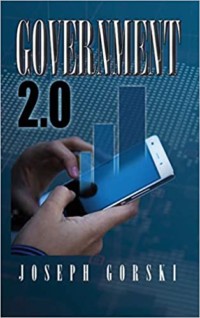Title: Government 2.0
Author: Joseph Gorski
Publisher: XlibrisUS
ASIN: b0793pwmsl
Pages: 88
Genre: Politics
Reviewed By: Dan MacIntosh
Pacific Book Review
With Government 2.0, author Joseph Gorski puts politics into technological terminology. In other words, American government – as it now stands – is old and outdated and badly in need of an upgrade. His book leaves the impression Gorski is equally disgusted with both Democrats and Republicans. Each party has let the country down. In fact, his hope is for the arrival of a new third party, which gets correct, what our legacy parties have gotten so wrong. In their place, Gorski is dreaming of a governmental third party in which citizens can truly believe in.
When reading his brief book, one naturally wonders if Gorski is conservative or liberal. Although he writes about the Tea Party, one cannot definitively peg Gorski as a true conservative. For instance, his vision sees the United States with a drastically smaller military, when conservatives are most often more like hawks than doves. Perhaps Libertarianism is closest to Gorski’s politics. The reason Gorski imagines a smaller U.S. military is because he wishes for a smaller government overall. One position that may please both libertarians and liberals, is how he believes a smaller military would increase peace and decrease wars. This would simply be because the government would not have the military might to engage in wars.
Some of Gorski’s other beefs include disenchantment with the banking system. For instance, he’s no fan of TARP (Troubled Asset Relief Program), which was an act that bailed out financial institutions after the subprime mortgage crisis. He believes the banks have far too much control over the government.
He closes his book with a chapter titled, “What The World Could Look Like In Twenty Years,” to conclude his utopian perspective. One of the changes he’s hoping for is a non-violation amendment passed into law that would forbid initiatory force, fraud, and coercion by government or any group. Specifically, this would then mean there would no longer be “a ruling class that suppresses the masses through taxation and rules mainly designed to enrich those at the top. All individuals, governments, and groups will have equal standing under the law.” Most Americans likely agree that the tax system has severe problems. Gorski is primarily looking to stop the government from seeking out and punishing citizens for failure to pay enough taxes. “Taxation will be voluntary and/or consist of user fees built into various financial transactions,” according to Gorski.
However, some of Gorski’s predicted improvements have little or nothing to do with intentional governmental changes. For instance, he views advancing technology – such as the growth and innovation of the Internet – as being both an equalizer and a way for more checks and balances of government practices. He also expects humans to “continue to live longer, healthier lives as biotech really is implemented into medicine at all levels.” Gorski also expects wars to decrease because nationalism will continue to decline, and people will “see themselves more as citizens of the world.” In, perhaps, his boldest statement, Gorski writes how we’ll witness “the end of banking as we know it with their power to create money out of thin air and collect interest on essentially nothing, enslaving the masses with debt.”
Although there are many contemporary democracies around the world, Gorski doesn’t always see these governments behaving like true democracies. Toward the very end of his book, Gorski states: “The people will no longer need permission from the government, but the government will need permission from the people on how to conduct business.” Isn’t that the way American government was initially intended to operate? The founding fathers didn’t want a populace that was ruled over by some king or queen. Instead, they envisioned a government that was based on the wishes of the people. Gorski, for one, doesn’t see American government acting as though it gives the citizens the power these days.
Although Gorski’s Government 2.0 is a short book, he packs a wealth of information into it. However, he does oftentimes repeat himself and the book could have used just a little more editing. Nevertheless, such instances never detract from the book’s overall effectiveness. Whether you agree with Gorski’s proposals or not, he deserves kudos for reimagining a better government. It’s easy to complain about the world, but it takes far more intelligence and wisdom to theorize about implementing serious improvements. Gorski is unafraid to dream big.


